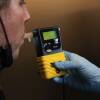Standing with the support of a cane on the steps of the Suffolk Superior Courthouse in Boston on Monday, Thomas Rosa Jr. beamed with joy as his attorneys proudly announced that a Superior Court judge had overturned his decades-old murder conviction.
At 62, Rosa, who grew up in Chelsea, had spent more than half his life imprisoned for a crime he did not commit, according to Radha Natarajan, his attorney and the executive director of the New England Innocence Project.
His attorneys also called for prosecutors to drop the charges, since the district attorney’s office could choose to move forward with a new trial.
“After everything Mr. Rosa has been through, a little rain is nothing,” Natarajan said, speaking to a small group of reporters under a warm summer drizzle. “The people of the commonwealth need to know what their money — their tax dollars — support. Is it the continued prosecution of an innocent man, or is it the dropping of the charges?”
Rosa was convicted for the 1985 murder of 18-year-old Gwendolyn Taylor in Boston. But, decades later, DNA evidence showed that saliva could not have been hers.
“Unfortunately, DNA technology was not available to him at that time,” Natarajan said.
Throughout the years, Rosa had steadfastly maintained his innocence, enduring three trials for the same crime, including one mistrial and one overturned conviction before his final conviction in 1993.
“He refused to plead guilty to a crime he did not commit — even though it meant that, instead of having freedom, he was risking being sentenced to life without the possibility of parole,” Natarajan said.
More Local News
New technology and analysis found that the victim’s DNA was absent from a coat presented as evidence by the prosecution to convict Rosa.
In June 2020, Rosa’s legal team, led by the New England Innocence Project and Boston College Innocence Program, filed a motion for a new trial. Rosa was released later that year while a Suffolk Superior Court judge reviewed the request.
Earlier this month, Suffolk Superior Court Justice Michael Ricciuti issued an order that vacated Rosa’s conviction and opened the door to the possibility of a new trial. In his decision, Ricciuti said new DNA evidence “debunks the prosecution’s closing statement” and “casts doubt regarding the reliability of the eyewitness testimony” in the case.
On Monday, Rosa refrained from responding to questions because, his attorneys noted, he still faces serious pending charges.
Now, the focus shifts to the Suffolk District Attorney’s office, which must decide whether to dismiss the charges against him or proceed with a new trial.
“We assented to the motion for a new trial based upon the relevant information,” a spokesperson for District Attorney Kevin Hayden wrote in an email. “We are in the process of reviewing the justice’s ruling and will make a decision at a future date.”
Natarajan, Rosa’s attorney, expressed hope that the state would drop the charges and forego seeking a new trial.
“This nightmare has gone on long enough,” she said. “This conviction was built on a house of cards with a foundation that has entirely fallen apart because of science. Science has evolved, and the criminal legal system needs to as well.”








